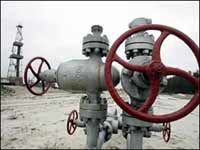If EU introduces sanctions against Russia, Europe will have severe problems with fuel
French Foreign Minister Bernard Kouchner stated that the European Union would be discussing two variants of sanctions against Russia at a forthcoming summit. The Polish variant stipulates the introduction of rather tough measures, whereas the Italian variant contains only abstract criticism of Russia’s actions.

The soft variant contains a requirement to pull out Russian troops from the territory of Georgia, from the port of Poti and buffer zones. In addition, the EU will ask for guarantees from Russia not to use its present line of behavior against other countries.
The tough variant of the document stipulates the introduction of financial and economic sanctions against Russia. According to this draft resolution, the EU may recommend large business to cut its financial investments in Russia and recognize the Russian market as highly unstable and risky. To make matters worse, the European Union may recommend European banks not to loan up Russian banks and companies.
Moscow hopes to conduct negotiations with several of its European partners in an attempt to push them to abstract formulations and abstain from sanctions.
The talks will most likely be conducted with Moscow’s potential allies – Germany, Italy, Spain, France and Finland. Russia may offer these countries a change of the Russian stance on the Iranian problem and economic preferences in return to their support.
Europe may suspend the talks on the partnership and cooperation agreement and activate efforts aimed to diversify fuel shipments to Europe.
The first measure does not seem to be of much importance to Moscow, although the second one can be quite dangerous. Russia may have severe problems with its gas pipeline projects known as the Northern Stream and the Southern Stream. In addition, Europe will most likely decide to accelerate the implementation of the Nabucco project that will deliver Caspian hydrocarbons to Europe bypassing Russia.
If Europe eventually decides to introduce sanctions against Russia, at least one Russian oil company may reduce crude shipments to Europe at Russian government’s request.
Russia may cut its oil shipments particularly to Poland and Germany. A reduction may occur already on September 1, Reuters reported with reference to British media. It is worthy of note that Prime Minister Putin stated in his recent interview with CNN that Moscow would not reduce its oil and gas shipments to Europe because Russia depends on its customers, just like the customers depend on Russia’s resources.
Russia’s Foreign Minister Sergei Lavrov described the idea of European sanctions against Russia as “a product of ill imagination.” Russia’s ambassador to the European Union, Vladimir Chizhov, urged the EU to abstain from the sanctions against Moscow.
It has just been reported that the European Union leaders will not decide on sanctions against Russia at a summit Monday in Brussels.
A high-ranking official in President Nicolas Sarkozy's office says that for now "we don't foresee any sanctions decided on by the European Council,” the AP reports.
The official acknowledges that some countries are pushing for sanctions against Russia over its crisis with Georgia. But Sarkozy's office believes Europe must concentrate now on pressuring Russia to apply a cease-fire agreement. France currently holds the EU presidency. The official spoke Friday on condition of anonymity because of office policy. He elaborated on remarks by France's foreign minister, who has said sanctions were being considered.
Subscribe to Pravda.Ru Telegram channel, Facebook, RSS!





